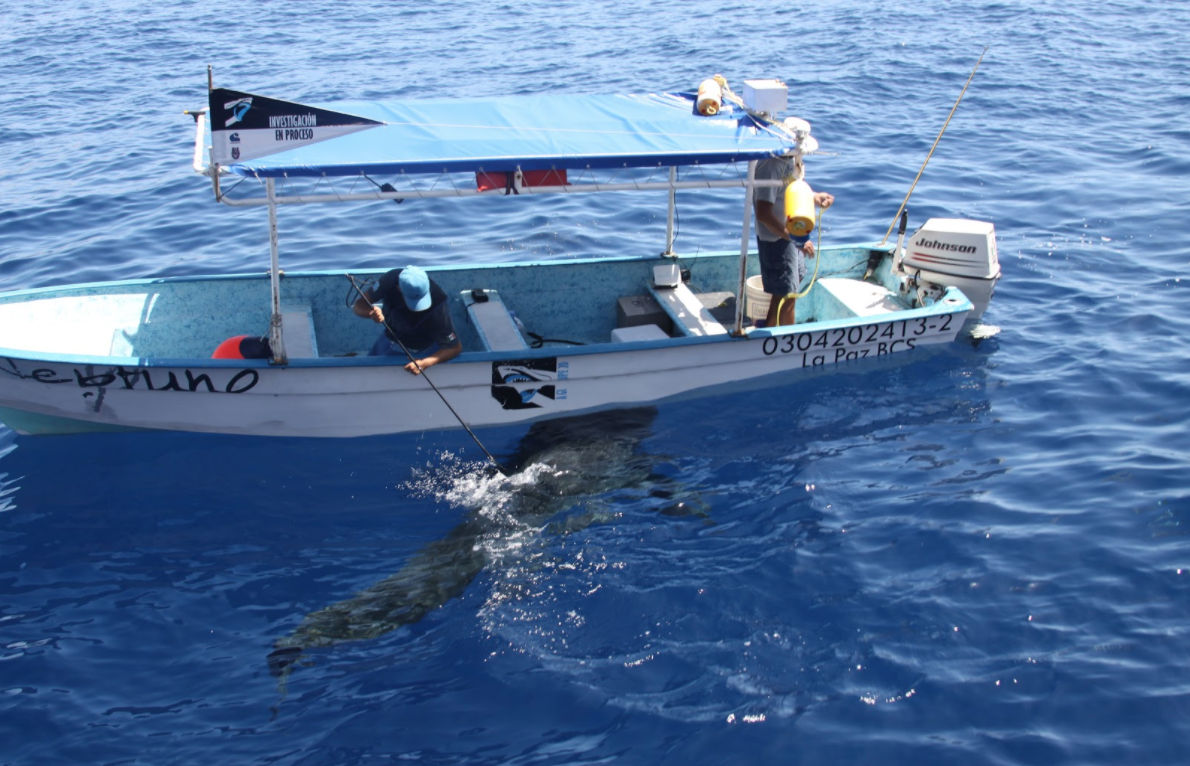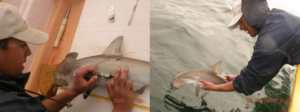

ICF’s Friends of Funds Spotlight: Pelagios Kakunjá, A.C.
When Mexican scientists Mauricio Hoyos and James Ketchum decided to create a marine conservation non-profit organization in Baja California Sur in 2010, they chose a name that would reflect both the organization’s mission and the region’s cultural history. And thus, Pelagios Kakunjá was born. Pelagios means “open sea” in Greek, and Kakunjá means “protection” in the indigenous Guaycura language.
A healthy marine ecosystem boasts abundant numbers of top predators and large pelagic species. All too often though, such species are officially endangered, with dwindling populations. By studying shark and manta populations in Mexico—two species that suffer greatly from overfishing—Pelagios Kakunjá provides critical technical information for regional management.
Pelagios Kakunjá works to understand the ecology and behaviour of marine predators, gathering and publishing information that helps create targeted conservation strategies. For example, their work on the critically endangered scalloped hammerhead in the Gulf of California revealed previously unknown information on the migratory patterns of juveniles—namely that they spend time both in coastal and pelagic waters, making them vulnerable to fishing in areas where they are insufficiently protected by law.

The efforts of Pelagios Kakunjá are far reaching, from local projects in surrounding waters such as those of the Bay of La Paz and Cabo Pulmo, all the way to the remote island archipelago of Revillagigedo, and as far south as the Clipperton Atoll. This method of long-term targeted research of key species, combined with data from across the Gulf of California and the Mexican Pacific, creates a wealth of knowledge and information that Pelagios can share with other scientists and regional decision-makers to help bring about better conservation strategies in their own backyard, and across the globe.
Pelagios Kakunjá imagines “a future with a sustainable sea where science-based conservation is a fundamental piece.” You can support this effort by donating to Pelagios Kakunjá to help them continue this vital work, and keep up with them on: Instagram, Twitter, Facebook.
Pelagios Kakunjá is a part of ICF’s “Friends of” Funds program. The “Friends of” Funds allow international nonprofit organizations to increase their net of potential donors to help support their missions and visions by establishing a fund with ICF. To learn more about the benefits of this program, and how to participate visit our website.
En el 2010, cuando los científicos mexicanos Mauricio Hoyos y James Ketchum decidieron crear una organización sin fines de lucro dedicada a la conservación marina en Baja California Sur, escogieron un nombre que reflejaría tanto la misión de la organización como la historia cultural de la región. Así nació Pelagios Kakunjá. Pelagios significa “mar abierto” en girego, y Kakunjá significa “protección” en el idioma indígena Guaycura.
Un ecosistema marino saludable cuenta con abundantes números de depredadores tope y grandes especies pelágicas. Sin embargo, con demasiada frecuencia, tales especies se encuentran oficialmente amenazadas, con poblaciones cada vez más escasas. Al estudiar poblaciones de tiburones y mantas en México—dos especies que sufren tremendamente de la sobrepesca—Pelagios Kakunjá brinda información crítica para el manejo regional.
Pelagios Kakunjá trabaja para entender la ecología y el comportamiento de depredadores marinos, recopilando y publicando información que ayuda a crear estrategias de conservación específicas. Por ejemplo, su trabajo sobre el tiburón martillo en peligro crítico de extinción en el Golfo de California reveló información previamente desconocida sobre los patrones migratorios de los juveniles—a saber, que pasan tiempo en aguas costeras y pelágicas, lo cual los hace vulnerables a la pesquería en áreas donde están insuficientemente protegidos por la ley.
 Los esfuerzos de Pelagios Kakunjá son de gran alcance–desde proyectos locales en aguas cercanas, como las de la Bahía de La Paz y Cabo Pulmo, hasta las islas remotas del archipiélago de Revillagigedo y tanto al sur como el Atolón de Clipperton. Este método de investigación de largo plazo enfocada en especies clave, combinado con datos del Golfo de California y el Pacífico Mexicano, crea una riqueza de conocimiento e información que Pelagios puede compartir con otros científicos y tomadores de decisiones para ayudar a fomentar mejores estrategias de conservación en su propia región y por todo el mundo.
Los esfuerzos de Pelagios Kakunjá son de gran alcance–desde proyectos locales en aguas cercanas, como las de la Bahía de La Paz y Cabo Pulmo, hasta las islas remotas del archipiélago de Revillagigedo y tanto al sur como el Atolón de Clipperton. Este método de investigación de largo plazo enfocada en especies clave, combinado con datos del Golfo de California y el Pacífico Mexicano, crea una riqueza de conocimiento e información que Pelagios puede compartir con otros científicos y tomadores de decisiones para ayudar a fomentar mejores estrategias de conservación en su propia región y por todo el mundo.
Pelagios Kakunjá imagina “un futuro con un mar sostenible donde la conservación basada en la ciencia es una pieza fundamental”. Pueden apoyar este esfuerzo haciendo una donación a Pelagios Kakunjá para ayudarlos en continuar este trabajo vital, y mantenerse al corriente a través de sus redes sociales: Instagram, Twitter, Facebook.
Pelagios Kakunjá es parte del programa Friends of Funds de ICF. Los Friends of Funds permiten que organizaciones sin fines de lucro internacionales puedan ampliar su red de donadores potenciales para apoyar sus misiones y visiones a través del establecimiento de un fondo con ICF. Para aprender más sobre los beneficios de este programa, y cómo participar visite nuestra página web.
[wpad-comment-form id=”883″]
Join Our Mailing List
Stay Connected with ICF
Be the first to get exclusive updates on
what ICF is doing to make a difference!
